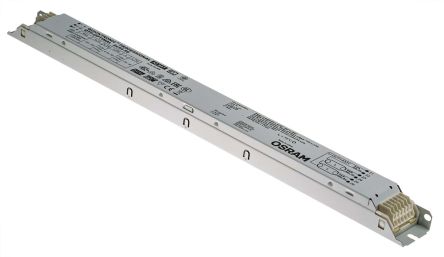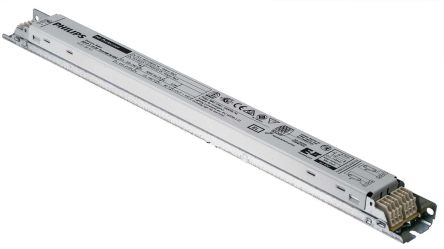- Automation & Control Gear
- Cables & Wires
- Enclosures & Server Racks
- Fuses & Circuit Breakers
- HVAC, Fans & Thermal Management
- Lighting
- Relays & Signal Conditioning
- Switches
- Batteries & Chargers
- Connectors
- Displays & Optoelectronics
- ESD Control, Cleanroom & PCB Prototyping
- Passive Components
- Power Supplies & Transformers
- Raspberry Pi, Arduino, ROCK, STEM Education & Development Tools
- Semiconductors
Fluorescent Lighting Ballasts
A lighting ballast helps to safely start and operate lighting equipment such as fluorescent or HID lamps. They provide the lamp with the correct voltage at its initial start-up and then adjust the voltage input to maintain the safe running of the lamp during use. Our range of lighting ballasts includes both electronic and electromagnetic products from some of the industry's leading brands, including Osram, Philips Lighting, Tridonic and our own RS PRO.
How do lighting ballasts work?
Without a ballast to limit its current as part of its circuitry, a fluorescent lamp would overheat and burn out within seconds, drastically reducing the bulb's operating life. The lights ballast counteracts this by briefly supplying an initial high voltage that establishes an arc between the lamps two electrodes when the bulb is turned on, bringing the light to life. Once this arc is established, the ballast can then quickly reduce the voltage and is then able to regulate the electrical current to produce a steady and safe light output without overheating or overpowering the bulb. This function allows the bulb to remain lit without issue and therefore extending its performance life. For more information on how it works, you can consult our complete lighting ballasts guide.
Types of Lighting Ballasts
The most common types of ballasts are magnetic and electronic, and they come in several start technologies to suit different purposes.
- Magnetic Ballasts - Magnetic ballasts are located inside your light sockets between the plug and the light bulb and the power cable. They convert mains electricity into a correct voltage to start, make sure that you always match the wattage of the ballast to the wattage of the lamp.
- Electronic Ballasts - Electronic ballasts alter the flow of electricity in the light bulb by using a series of induction coils that are separated from one another. They change the frequency of the electrical current without changing the voltage. While magnetic ballasts in fluorescent lamps work at a frequency of 60 Hz, electronic ballasts greatly increase that frequency of 20000 Hz. This high frequency ensures you will not see the lights flickering and will not hear a buzzing sound.


